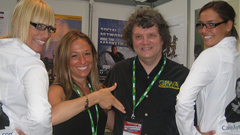What makes casino affiliates successful is the million dollar question because if you know the answer, you’re probably making millions. Affiliate programs will pay their largest CPAs for Casino Players, up to $400 per new depositing US player back in the pre-UIGEA glory days! Scoring one whale of a slots player on a rev share alone is enough to pay the bills for life, so imagine if you had a lot of them tagged to your affiliate ID?
 When you look at the best casino affiliates around, their formulas for success are all over the map, spanning from expert (and sometimes sneaky) SEO strategy strategies to getting into the business early, incredibly hard work, identifying their niche, to just plain luck or some combination of the above.
When you look at the best casino affiliates around, their formulas for success are all over the map, spanning from expert (and sometimes sneaky) SEO strategy strategies to getting into the business early, incredibly hard work, identifying their niche, to just plain luck or some combination of the above.
Launched in 1995, CasinoCity.com is “an information source for gaming enthusiasts and professionals” and one of the online gambling industry’s most well known “Super Affiliates”. While it would be impossible to mimic the exact strategy of CasinoCity.com and more specifically Online.CasinoCity.com as they got into the game so early, we can still learn a lot from how they have maintained their success over the years in such a turbulent marketplace. I talked directly with my good friend and former boss Michael Corfman, the President & CEO of CasinoCity.com, to share with you history of his company the secrets of its success.
Becky Liggero: Thank you so much for joining me Michael, can you share with us how you came up with the idea for CasinoCity.com and when was it actually launched?
Michael Corfman: The idea for CasinoCity.com came about in early 1995. At that time the company my wife, Sylvia, and I founded (Information Technology Systems, Inc.) had been in business for about five years. The company was focused on providing consulting services developing software that ran on IBM mainframe computers, and we made a decision to switch our technical focus to developing web-based applications, having decided the Internet was the wave of the future.
We decided that we would build a demo website, both to learn what was involved, and also to have something we could show others to demonstrate we knew how to build web-based applications. One of our larger customers at the time was the Showboat Casino located in Atlantic City, New Jersey. So we decided to build our demonstration website that was a directory of land-based casinos, together with the ability to search for specific types of casinos.
We finished the first version of CasinoCity.com in time to demonstrate it at the Internet World conference in Boston in the fall of 1995. That was a great show for us. The site had features that amazed folks at the time: a sophisticated search facility together with animated blinking neon signs. It was easy to pull up a list of all the casinos in Las Vegas where you could play blackjack and that also had a pool and an Italian restaurant. We literally had people lined up out of the booth to see demonstrations, and we came away with the contacts that turned into the first of many web consulting clients.
BL: When did you realize that there was a lot of money to be made via affiliate commissions with CasinoCity.com?
MC: Even though we initially developed CasinoCity.com as a demonstration site, it became very popular with many millions of visitors every year. Then banner advertising came into existence, so it became possible to monetize web traffic. And, finally, the first few online casinos came into existence, and we were approached about advertising on the site by a few of them. The site was tailor-made for their target audience
It started out slow, but with amazing results for the advertisers. The very first banner we ran actually had a 30% click-through rate – banners were a novelty at the time. As revenue grew, the site became an important part of our business, and not just a labor of love we worked on when there was some spare time between consulting assignments.
BL: My god, a 30% click-through rate, that’s hard to imagine these days! So when and why did you make the leap to Online.CasinoCity.com?
MC: CasinoCity.com was initially just a directory of land-based casinos – there were no online casinos when it was first built. In the early days that attracted an audience interested in gambling that was spending time on the Internet. That combination worked very well for our early audience and early advertisers. But at the online gambling marketplace grew, there was a lot more information to share with visitors than just a list of a few dozen online gaming sites.
So we decided that we needed to build a full-blown directory covering the online gaming sites just like we already covered land-based gaming facilities. For quite a while we kept that information integrated in the CasinoCity.com website. But in 2004 we took the step of separating out all of our online gaming information to a site of its own. At the time we had nearly 2,000 online gaming sites in our directory, and so a distinct site with separate navigation was certainly a sound decision.
But we didn’t just move the information we had to a new site, we completely reorganized the way it was presented. We used the data we had about which sites were most popular to produce ranked lists by gaming vertical, and we cross-referenced and linked to sites based on the wealth of information our online gaming research team gathered.
BL: Fascinating to hear how it all started. What are some of the key ingredients responsible for Casino City’s success since its launch?
MC: I think there are a few key ingredients. The first is that we have always viewed that our number one job is to provide the most complete and comprehensive directory in the world about the gaming industry. We have consistently invested in staff to perform the research necessary to be the best directory in the world. Second, we are a software engineering and database development organization at heart. So we have consistently focused on enhancing our technical infrastructure based on a sound vision of where we are trying to go. Finally, by having a wide variety of products that make use of the gaming-related information we gather from a variety of perspective, we bring an economy of scale and overall quality to the work we do that facilities our being the best-in-the world in our marketplace.
BL: How much work and manpower is involved with maintaining a portal such as Casino City?
Answering that question for a single portal site is a complicated question because each portal site is part of a larger business. We have portal sites for both players and for industry executives, and we have products, such as print publications, that also use the databases of information built by our research and editorial teams.
In total we currently have about thirty staff members. About half of our staff is responsible for content. We have three content teams. One focuses on conducting research and ensuring our database of online gaming information is complete and accurate, and another team does the same of land-based gaming information. A third team is our editorial staff responsible for researching and reporting news and for overseeing editorial content obtained from third parties. The other half of our staff is split between software development and technical infrastructure, sales and customer service, and finance and management.
BL: A number of casino affiliates were either wiped or hit really hard after UIGEA was passed. How did you survive this unexpected hit to the industry?
MC: There are two answers to this question. First, our business spans a variety of areas, and currently only about 50% of our overall business is related to the online gaming industry. We provide many products to the land-based gaming industry, and we also provide web consulting and hosting services to businesses not involved in gaming.
But we also survived because we very deliberately made changes to adapt to the way the online gaming industry changed. The marketplace has transformed from one in which almost all operators accept players from every jurisdiction in the world to one where the marketplace is highly fragmented with different sites accepting players from their own set of jurisdictions. So we rapidly evolved online.casinocity.com so that it understood where a player was located, and what language they spoke, and automatically presented sites that were available to them. In many ways a more complicated marketplace plays to some of our key strengths: the ability to manage and maintain large complex databases of information and to present that information to our visitors tailored to their specific needs.
